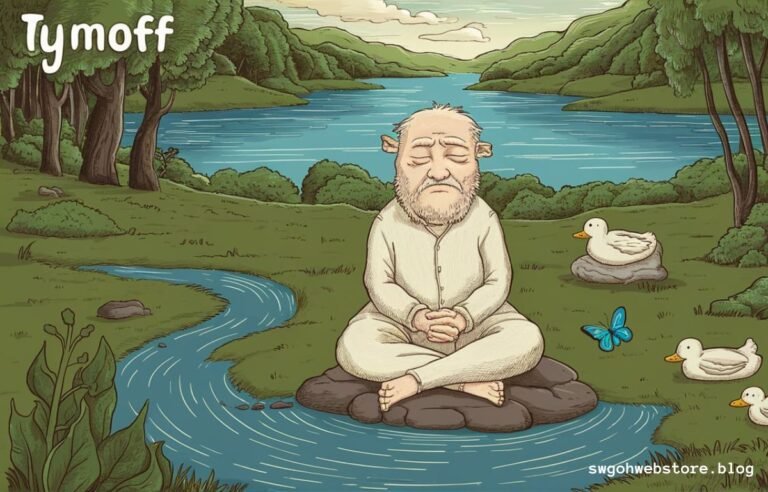In today’s busy world, it’s easy to feel like we need to react to everything. However, learning to sit back and observe can help us stay calm and make better choices. The quote “Learn to sit back and observe. not everything need – tymoff” reminds us that not all situations need an immediate response. Sometimes, just watching and thinking before acting can lead to better results. This approach can reduce stress and allow us to see things more clearly.
Observing can also teach us patience. When we don’t rush to react, we notice details we might have missed. Learning to sit back and observe lets us understand situations better and respond wisely. By following the idea in “Learn to sit back and observe. not everything need – tymoff,” we can handle challenges more thoughtfully. Taking a step back helps us grow emotionally and make more balanced decisions in life.
The Power of Observation: Learn to Sit Back and Observe. Not Everything Need – Tymoff
Observation is a powerful tool that helps us understand the world better. When we learn to sit back and observe, we gain a new perspective on situations. The quote “Learn to sit back and observe. not everything need – tymoff” shows that sometimes it’s better to watch quietly instead of jumping to conclusions. This practice allows us to gather more information before making a decision. Observing can help us avoid unnecessary conflicts and make more thoughtful choices.
By observing, we can see patterns and understand people’s actions more clearly. Learning to sit back and observe also helps us manage our emotions, as we are not reacting immediately. The phrase “not everything need” our quick reaction means that we can let go of the need to control every moment. This leads to more peaceful and balanced relationships, both with others and ourselves. Through observation, we become more aware of what truly matters in each situation.
Not Everything Needs a Reaction: Learn to Sit Back and Observe. Not Everything Need – Tymoff

One of the key lessons from “Learn to sit back and observe. not everything need – tymoff” is that not everything requires an immediate response. Often, we feel pressured to react quickly, but staying calm can be more beneficial. By choosing not to react right away, we give ourselves time to think and understand the situation better. This practice helps us avoid impulsive decisions and unnecessary arguments. Observing first allows us to respond more wisely when needed.
In many cases, our reactions may make things worse rather than better. Learning to sit back and observe teaches us patience and shows that some situations will resolve themselves. The phrase “not everything need” a quick response is a reminder to choose our battles carefully. By not reacting to every small issue, we can save energy for what truly matters. This approach also helps us stay more balanced and in control of our emotions.
Emotional Intelligence and Observation: Learn to Sit Back and Observe. Not Everything Need – Tymoff
Learning to sit back and observe is closely tied to emotional intelligence. Emotional intelligence means understanding your own feelings and those of others. The quote “Learn to sit back and observe. not everything need – tymoff” highlights how important it is to control our emotions before reacting. By observing situations calmly, we can think more clearly and avoid emotional outbursts. This helps us build stronger relationships with others because we are more thoughtful in our actions.
When we don’t rush to react, we show emotional maturity. Learning to sit back and observe gives us time to process emotions and choose our responses wisely. The phrase “not everything need” immediate action reminds us that sometimes it’s better to pause and reflect. By doing this, we avoid making mistakes driven by emotions. Emotional intelligence is about managing feelings, and observation is a key skill that helps us do that effectively.
The Impact of Observing in Relationships: Learn to Sit Back and Observe. Not Everything Need – Tymoff
In relationships, learning to sit back and observe can improve how we connect with others. Often, we rush to speak or act, but the quote “Learn to sit back and observe. not everything need – tymoff” teaches us to be patient. By observing, we better understand the feelings and actions of those around us. This helps reduce misunderstandings and leads to healthier conversations. Taking a moment to observe can prevent unnecessary arguments and strengthen bonds.
Observing in relationships also shows respect. When we pause and listen instead of reacting quickly, we show that we care about the other person’s thoughts. Learning to sit back and observe allows us to see things from the other person’s perspective. The idea behind “not everything need” an immediate response is especially useful during conflicts. By observing first, we give space for more thoughtful and kind communication, which helps build trust and connection.
Observing as a Path to Personal Growth: Learn to Sit Back and Observe. Not Everything Need – Tymoff

Learning to sit back and observe is a powerful way to encourage personal growth. When we observe instead of acting quickly, we give ourselves time to reflect and learn from experiences. The quote “Learn to sit back and observe. not everything need – tymoff” reminds us that not everything needs our immediate involvement. By watching how situations unfold, we can gain valuable insights into our own behavior and improve ourselves. Observation helps us identify areas where we can grow and make better decisions in the future.
Personal growth often comes from understanding our own reactions. Learning to sit back and observe allows us to see patterns in our thoughts and actions, which can lead to self-improvement. The phrase “not everything need” instant attention means that sometimes stepping back is the best way to grow. By observing our responses to challenges, we can develop stronger emotional control and mindfulness. This approach leads to becoming more self-aware and resilient in life.
Practical Tips to Master the Art of Observation: Learn to Sit Back and Observe. Not Everything Need – Tymoff
Mastering the art of observation takes practice, but it’s a valuable skill for a calm and thoughtful life. Learning to sit back and observe starts with being mindful of your surroundings. Take a deep breath and pause before reacting to any situation. The quote “Learn to sit back and observe. not everything need – tymoff” reminds us that not every situation requires immediate action. By simply observing, we can gather more information and make better decisions.
To improve your observation skills, try staying quiet and listening more in conversations. This gives you the chance to understand others without jumping to conclusions. Learning to sit back and observe also means practicing patience—allow events to unfold naturally. The phrase “not everything need” your immediate reaction can serve as a daily reminder to relax and watch before acting. With time, you’ll find that observing first leads to wiser and more peaceful outcomes.
Also Read: Impact of Galaxy: Aotbpbf1Nps= Stitch
Sitting Back and Letting Go of Control: Learn to Sit Back and Observe. Not Everything Need – Tymoff
Letting go of control is a key part of learning to sit back and observe. We often feel the need to manage every situation, but the quote “Learn to sit back and observe. not everything need – tymoff” teaches us that not everything is within our control. Sometimes, it’s better to step back and let events take their natural course. This helps reduce stress and gives us the chance to understand situations more fully before getting involved.
By practicing this, we can learn to trust the process and avoid unnecessary worry. Learning to sit back and observe shows us that trying to control everything can lead to frustration. The idea behind “not everything need” our constant attention is that some things resolve themselves without interference. Letting go of control allows us to focus on what truly matters and brings more peace and balance into our lives.
Mindfulness and Observation: Learn to Sit Back and Observe. Not Everything Need – Tymoff

Mindfulness and observation go hand in hand, helping us live more peacefully. Learning to sit back and observe is a form of mindfulness, where we focus on the present moment without rushing to react. The quote “Learn to sit back and observe. not everything need – tymoff” encourages us to practice patience and awareness. By observing mindfully, we can notice the small details that we often miss when we act too quickly. This leads to a deeper understanding of ourselves and the world around us.
Mindfulness also helps us stay calm in stressful situations. When we learn to sit back and observe, we allow ourselves the space to process emotions without being overwhelmed. The phrase “not everything need” immediate action reminds us that it’s okay to pause and reflect. Mindful observation can be practiced through meditation, deep breathing, or simply taking a moment to focus on our surroundings. This approach brings clarity and helps us make wiser choices in life.
Conclusion: Embracing the Power of Observation: Learn to Sit Back and Observe. Not Everything Need – Tymoff
In conclusion, learning to sit back and observe is a valuable skill that can transform our lives. The quote “Learn to sit back and observe. not everything need – tymoff” serves as a powerful reminder that not every situation requires an immediate response. By embracing observation, we can enhance our emotional intelligence, improve our relationships, and foster personal growth. Taking a moment to observe helps us make thoughtful choices rather than reacting impulsively, which can lead to better outcomes.
As we practice learning to sit back and observe, we can cultivate a sense of calm and clarity in our lives. The wisdom in “not everything need” immediate attention encourages us to let go of control and trust the process. By making observation a regular part of our lives, we become more mindful, resilient, and aware. Ultimately, this practice not only benefits us but also enriches our connections with others, creating a more balanced and fulfilling life.
Frequently Asked Questions
What does it mean to “learn to sit back and observe”?
Learning to sit back and observe means taking a step back in any given situation to watch and understand instead of reacting immediately. This approach allows you to gather more information, think clearly, and avoid impulsive decisions. It encourages mindfulness and can lead to better outcomes in various aspects of life, including personal relationships and emotional well-being.
How can observing help improve my relationships?
Observing can significantly enhance your relationships by promoting better communication and understanding. When you learn to sit back and observe, you give yourself the chance to listen and comprehend the perspectives of others. This practice helps prevent misunderstandings and unnecessary arguments, leading to deeper connections and healthier interactions.
Why is it important to let go of control?
Letting go of control is important because it reduces stress and anxiety. When you learn to sit back and observe, you recognize that not everything requires your immediate involvement. The ability to step back and allow situations to unfold naturally fosters a sense of trust and can lead to more positive outcomes, as well as a greater sense of peace in your life.
How can mindfulness and observation be practiced together?
Mindfulness and observation can be practiced together by focusing on the present moment without rushing to react. This can be done through meditation, deep breathing exercises, or simply paying attention to your surroundings. By integrating mindfulness into your observation practice, you can enhance your awareness of your thoughts and feelings, making it easier to respond thoughtfully rather than impulsively.
What are the benefits of developing observation skills?
Developing observation skills offers numerous benefits, including improved emotional intelligence, better decision-making, and enhanced self-awareness. When you learn to sit back and observe, you become more attuned to the dynamics of situations, allowing you to respond more wisely. Additionally, strong observation skills can lead to personal growth and greater resilience in facing life’s challenges.

Alice, an 8-year veteran, blends tech savvy with wanderlust. His fashion-forward perspective and business acumen create captivating content. Explore realms where innovation meets style.